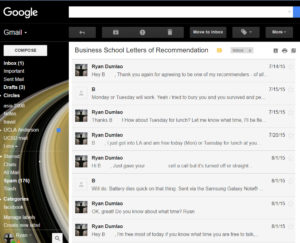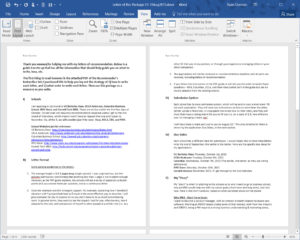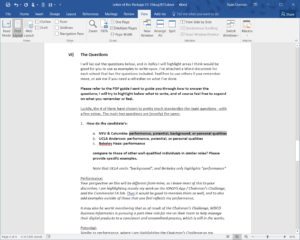An Apology
WOW! I completely dropped the ball on this. I expected my first quarter of business school to be like drinking water from a firehose, and… well that’s exactly what it was! I rarely found time to sit down, and as such let my ambitions with this blog slide, sadly.
However! I’m back for the holidays, fresh off finals and in the midst of internship recruiting for the summer. I’ve had the opportunity to represent Anderson to prospective students throughout the year via our Admissions Ambassador Corps, bringing students to class, acting as the digital face of the school, and most recently holding coffee chats in LA (and soon to be in SF) with prospective and admitted students. Through a few of these, I’ve realized the most helpful post I can come up with right now regards two topics for Round 2 applicants: your essays, and your recommendations. Let’s hit on recommendations today.
Gathering those Recommenders
My process for getting my recommendations was fairly straightforward, and something most people should follow:
- Get two people who have directly managed you and know you well
- Make sure they can write something strong on your behalf
- Make sure they’re reliable to get it submitted in time
I will talk most about #3, but let me jump on an aside to #1 and #2 for a quick minute – you may run into a decision point between two options:
- A direct manager whose title is mid-level management, but has worked with you and seen you grow and evolve for 1-3 years
- Someone with a high title (CEO, big name, etc), who you dabbled with on a short term basis, but had a good interaction with.
As almost every guideline will tell you, it is almost ALWAYS better to go with the first option – someone who knows you well, can speak to your accomplishments and struggles in a clear and concise way, and can truly vouch for you and write for you with passion. Just because your CEO knows your name does not mean they can write something well-meaning for you. The weight of your recommender’s title or name does not matter to the adcom, no matter how much you’d wish it does. There are probably some exceptions, but being realistic, 99.999% of people are not in this exception. Go with the one who can write highly and in-depth about you.
Back to the topic at hand. Many (including myself) struggle with #3. Keeping our recommenders in line and on schedule, while staying cordial and supportive throughout so that you end up with a sparkly, beaming and adcom-aweing letter, can be hard. You need to let your recommenders know early, and give them sufficient resources for which to write a letter for you. I picked two people for my recommenders: my current direct manager, Director of Engineering, and previous manager from a rotation at another company who I knew held me in very high regard because of my impact there. I chose the first one for his obvious recent insight into my potential, and I chose the second one because I knew he saw how effective I could be, and would be happy to help me out.
Getting your recommendations on time – start early!
I was set! Or so I thought. I reached out to both recommenders 3 months early – way early, but I’m a paranoid person and I wanted my ducks in line. However, I knew how busy these guys would be, and how much I was asking of them to write a different letter of rec for me for 5 different schools. And YES, each school asks different questions (there are similarities), so they need to cater each letter to each school. So, knowing that I had a looming deadline to impose on these two, and knowing how I wanted to pitch myself to each school, I set out to make the letter writing process for them as easy as possible.
I think it should be a given, especially if you follow Essay Snark like my previous post suggested, but I’d also like to take the time here to say – DO NOT WRITE YOUR OWN RECOMMENDATIONS! If your recommender can’t write something strong for you or doesn’t have the time, find a new recommender. If you went against all advice and chose a high-profile recommender who can’t write much personally about you, and asks you to write it for them, this is your 2nd chance to move on from them. Adcoms can tell when you’ve written your own, no matter how clever you think you are. In addition, your recommenders will inevitably provide a different perspective, story and overall picture of you then you could ever write about yourself. DO NOT WRITE YOUR OWN!! Got it? Good.
So, it’s not only a good idea to get your recommenders lined up early, but to be active in keeping them engaged with you and the letter-writing process. Once you start filling out a school’s application, you can immediately prompt it to send the e-mails to your recommenders, which will contain the questions to be answered and the links to the webforms they must fill out to answer them. In general, you should have access to the questions as well – either they’re posted on the school’s application info site, or you can ask your recommenders for the prompts. You want to get these ahead of time, so you can help prepare them.
Guiding your recommenders
For my 5 schools, I gathered up the questions and wrote a multi-page document for both of my recommenders (unique to each) that outlined several things. This document served as the source of all information they’d need to write, and what I wanted them to highlight. I’ll detail how I structured these docs, but they’re just a framework and you can feel free to do as much (or as little) as you want; they key is simply to make their lives easier and the process faster. I broke my doc into these sections:
- Thank you
- Schools I was applying too
- Format of the letters
- Details on the submission system
- Due dates
- My “Story” (Why MBA?) – Short term, long term, and why now?
- The Questions [More on this in the next section]
- Thank you again
The flow was designed to give them a full rundown on what to expect, when to submit, where to submit, etc. Like I said, make it as easy as possible. For the “Story” portion, I detailed WHY I wanted an MBA, and WHAT I planned to do with it in the short and long term. Ideally, you would also discuss this with them in person. The bulk of the document went to “The Questions”, where I laid out each question for each school.
The Questions
Now, the b-schools tried to come so some kind of consensus (at least for 2015) on a main question for recommenders, but of course each one decided they are special and modified it – specifically, the 2015 question:
- “How do the candidate’s ______ compare to those of other well-qualified individuals in similar roles? Please provide specific examples.”
The ______ here changed for each school. For Stern, it was “performance, potential, background, or personal qualities”, whereas for Haas, it was JUST “performance.” I made it clear to them the differences for each question.
To make it easier, I provided a short example for each quality (performance, background, etc) that I suggested them to use if they pleased; however, I told them it was ok to use whatever they felt was a good example. My recommenders ended up using a mix of both my suggestions and their own perspective, which is ideal since they have a better view of you as a candidate than you would alone. In addition, all 5 schools asked the same 2nd question with the same wording (thankfully), which was:
- “Describe the most important piece of constructive feedback you have given the applicant. Please detail the circumstances and the applicant’s response.”
I gave a quick example for this, and moved on to the individual school questions. Three of the schools I applied to added additional questions along with the previous two, so I added more examples (mostly continuations of the previous examples I had given and how they applied to these questions). As I keep saying, make it as easy as possible for them – give them the content you hope them to use, to frame the letters properly with the rest of your app, but realize it’s their prerogative to write what they feel strongest about.
Additional help / resources
In addition to this guide, I found one more external resource to be extremely helpful to them – the Essay Snark Recommender Instruction Sets (note this is a simple plug, I don’t gain anything from you using them). Through their service I was able to purchase a guide for my recommenders specifically catered to the schools I was applying to. I purchased the 3-school set, for Anderson, Stern and Columbia for $99. I didn’t include Haas or Cornell in order to save some $, and also because they were similar enough. The guide takes each school and lays out a specific strategy for your recommender to write – Start with School A, then modify that response slightly for School B, and add this for School C. In the spirit of making things easier for them, I felt this was a great tool to provide them, and ensure they’d have the least amount of friction writing so that they could submit on time!
Getting that on-time submission
Alright, so you’ve done all the upfront legwork – picking good recommenders, telling them early, prepping them for what to expect and giving them a start on the content of the letters. That’s easy enough (ha!); now you have to make sure they deliver! I can tell you that as prepared as it seemed I looked, I still had to wait down to the wire for one of my letters – and it was stressful as hell. The best you can do is put as much pre-work going into it as you can, and deal with any obstacles along the way. Some general tips:
- Keep reminding them, but not incessantly. At most once every few days, until there’s only a week or two left.
- Depending on your relationship, as time gets more crucial it should be OK to text or call them, but use your judgement.
- Actively evaluate if you think they will truly get it in on time. Have a backup if you think you might risk one being unreliable.
- Take a breath and have faith in your recommender. If your relationship is as solid as it should be, 99% of people won’t leave others hanging.
- If they offer to let you review what they wrote, you can accept, but don’t try to change their words unless they ask. It is still their letter.
Hopefully, though, if you’ve done enough ahead of time and given them as much as possible to make their life easier, they should have your back and get things in time so you can worry about the rest of your application instead.
Final Thoughts
The letters of rec started for me as an early afterthought, but after realizing the possible pain points of the process, I made sure I optimized as much as I could control to minimize my stress. Putting the effort in ahead of time, picking quality recommenders and staying on top of things will be your best path to success. Good luck!



